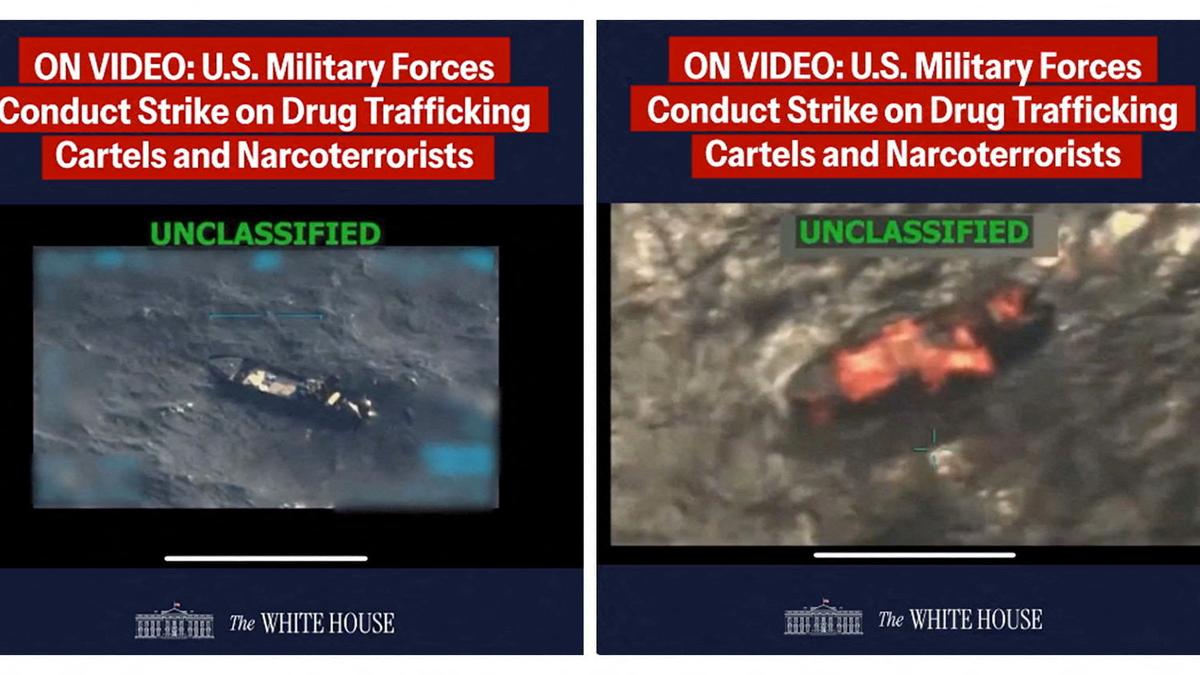President Donald Trump has declared drug cartels to be unlawful combatants and stated that the United States is now in an “armed conflict” with them. This revelation comes from a Trump administration memo obtained by The Associated Press on Thursday, October 3, 2025, following recent U.S. strikes on boats in the Caribbean.
The memo represents an extraordinary assertion of presidential war powers, with Mr. Trump effectively declaring that drug trafficking into the United States amounts to an armed conflict requiring the use of military force. This is a new rationale for both past and future actions.
> “The President determined that the United States is in a non-international armed conflict with these designated terrorist organizations,” the memo states. Mr. Trump directed the Pentagon to “conduct operations against them pursuant to the law of armed conflict.”
The memo continues, saying, “The United States has now reached a critical point where we must use force in self-defense and defense of others against the ongoing attacks by these designated terrorist organizations.”
This development signals a potential shift not only in the administration’s willingness to exceed traditional presidential authority to wage war but also in Mr. Trump’s stated America First agenda, which typically favors non-intervention overseas. It raises serious questions about the extent to which the White House intends to use its war powers, and whether Congress will assert its authority to approve or reject such military actions.
### Declaration Follows Strikes on Boats in the Caribbean
Last month, the U.S. military carried out three deadly strikes against boats in the Caribbean accused of ferrying drugs. At least two of these operations were conducted against vessels originating from Venezuela. These strikes followed a buildup of U.S. maritime forces in the Caribbean not seen in recent history.
Though the memo did not include a timestamp, it references a September 15 U.S. strike that resulted in the destruction of the vessel, confiscation of illicit narcotics, and the deaths of approximately three unlawful combatants.
White House deputy press secretary Anna Kelly stated, “As we have said many times, the President acted in line with the law of armed conflict to protect our country from those trying to bring deadly poison to our shores. He is delivering on his promise to take on the cartels and eliminate these national security threats from murdering more Americans.”
The Pentagon referred questions to the White House. Pentagon officials briefed senators on the strikes on Wednesday, according to a person familiar with the matter who spoke under conditions of anonymity.
### Legal and Congressional Concerns
During the classified briefing at the Capitol, several senators perceived the Trump administration’s outlined legal framework as a new and controversial approach—raising significant questions about Congress’s role in authorizing such military actions.
The memo sets out the administration’s justification for past military strikes against boats in the Caribbean—actions that have raised concerns among lawmakers about their legality—and potentially legitimizes future operations.
### Details on Targeted Cartels Remain Sparse
President Trump has designated several Latin American drug cartels as foreign terrorist organizations. The administration previously justified military action as a necessary escalation to stem the flow of drugs into the United States.
However, Pentagon officials could not provide a list of the designated terrorist organizations involved in the conflict. This lack of transparency frustrated some lawmakers who were briefed on the matter.
While allied nations have made significant efforts to combat these groups, the memo states that the cartels have become transnational and conduct ongoing attacks throughout the Western Hemisphere as organized entities. It refers to cartel members as unlawful combatants.
### Bipartisan Push for Congressional Authorization
As the Republican administration targets vessels in the Caribbean, lawmakers from both major political parties have expressed objections. They have pressed Mr. Trump to seek war powers authorization from Congress for such military operations.
The first military strike, carried out on September 2 against what the Trump administration described as a drug-carrying speedboat, resulted in 11 deaths. Mr. Trump claimed the vessel was operated by the Tren de Aragua gang, which the U.S. designated as a foreign terrorist organization earlier this year.
Several senators and human rights groups have questioned the legality of these actions, calling them a potential overreach of executive authority—particularly because the military was used for law enforcement purposes.
The Trump administration has yet to explain how the military evaluated the boats’ cargo or determined the passengers’ alleged gang affiliations before conducting the strikes.
### Senator Jack Reed Reacts
Senator Jack Reed of Rhode Island, the top Democrat on the Senate Armed Services Committee, commented on the situation:
> “The drug cartels are despicable and must be dealt with by law enforcement. The Trump Administration has offered no credible legal justification, evidence, or intelligence for these strikes.”
A former Army officer who served in the 82nd Airborne Division, Reed’s criticism underscores the ongoing controversy surrounding the administration’s approach to combating drug cartels.
—
The unfolding situation highlights the complex balance between national security, executive authority, and legislative oversight as the U.S. grapples with transnational drug trafficking and its consequences.
https://www.thehindu.com/news/international/trump-says-us-in-armed-conflict-with-drug-cartels-after-ordering-strikes-in-the-caribbean/article70119237.ece
